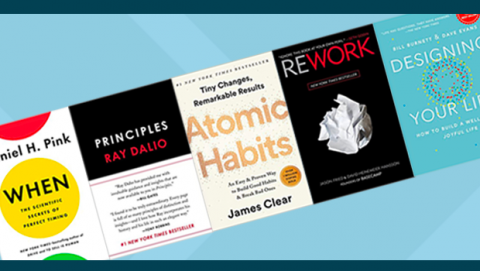For many people, working from home means more meetings, one-on-ones, and check-ins with colleagues throughout the day. It also means more life distractions – kids, pets, laundry, package deliveries, etc. – that can pull your attention and interrupt focus time between meetings and Slack chats. If your day is consistently getting away from you, it might be time to rethink your approach to productivity.
[ Want a fresh perspective on core and emerging technologies? Read also: 9 must-read technology books for 2020. ]
Consider these recommendations from our community for books that can help you hack your to-do list, create meaningful habits, and lean into the activities that energize you throughout the day. While these books can’t give you an extra hours in your day, they can help you make the 24 you do have more productive.
Atomic Habits: An Easy & Proven Way to Build Good Habits & Break Bad Ones
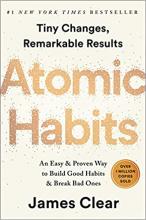
By: James Clear
Book description (via Amazon): Clear is known for his ability to distill complex topics into simple behaviors that can be easily applied to daily life and work. Here, he draws on the most proven ideas from biology, psychology, and neuroscience to create an easy-to-understand guide for making good habits inevitable and bad habits impossible. Atomic Habits will reshape the way you think about progress and success, and give you the tools and strategies you need to transform your habits
Why you should read it: “Good habits, like going to gym, need to become a lifestyle change in order to be successful. To be a continuous learner, you need to have good habits at work,” says Denise Broady, COO at WorkForce Software. “According to James Clear, if you improve habits by one percent each day for one year, you’ll end up thirty-seven times better by the time you’re done. Imagine applying this at work.”
“I don’t set goals anymore unless they become a habit,” says Broady. “For example, I recently wanted to read more, but it was a tough goal to fit into my busy day. I applied the Atomic Habit and now get up between 5:00 to 6:00 a.m. just to read for an hour. It’s now a daily habit that I’ve integrated into my life. I have also applied his book for work productivity with little tweaks in my habits, such as color coding my calendar and having an hour every day for ‘think time’ to be more strategic at work. Changing the mindset from ‘setting goals’ to ‘adopting daily good habits’ helps me keep everything consistent.”
Principles: Life and Work
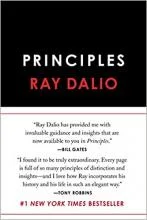
By: Ray Dalio
Book description (via Amazon): In Principles, Dalio shares what he’s learned over the course of his remarkable career. He argues that life, management, economics, and investing can all be systemized into rules and understood like machines. The book’s hundreds of practical lessons, which are built around his cornerstones of “radical truth” and “radical transparency,” include Dalio laying out the most effective ways for individuals and organizations to make decisions, approach challenges, and build strong teams. While the book brims with novel ideas for organizations and institutions, Principles also offers a clear, straightforward approach to decision-making that Dalio believes anyone can apply, no matter what they’re seeking to achieve.
Why you should read it: “One of the key lessons of Principles is how companies can organize into ‘machines’ to achieve goals in a repeatable and scalable manner,” says David Karandish, CEO of Capacity. “This approach intersects with the work we’ve done at Capacity and how we organize our own business, as well as how we implement our machines through our Workflows product. In normal times, prioritization is important for a startup. In a global pandemic, prioritization is crucial. We are doing a full process review across the entire company to identify what areas can and should be automated. Dalio’s book provides a helpful framework for taking an objective view of disparate parts of the company and deciding where to focus."
When: The Scientific Secrets of Perfect Timing
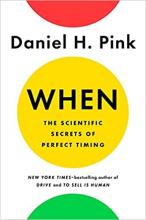
By: Daniel H. Pink
Book description (via Amazon): Everyone knows that timing is everything. But we don’t know much about timing itself. Our lives are a never-ending stream of “when” decisions: when to start a business, schedule a class, get serious about a person. Yet we make those decisions based on intuition and guesswork. Timing, it’s often assumed, is an art. In When: The Scientific Secrets of Perfect Timing, Pink shows that timing is really a science. Drawing on a rich trove of research from psychology, biology, and economics, Pink reveals how best to live, work, and succeed.
Why you should read it: “One of the key concepts in the book discusses practices for determining when you work the best based on your mental alertness and physical energy during any given 24-hour period. Based on these findings, the book shares how to optimize your daily schedule while sharing tips for what to do when you don’t have control over your regular schedule,” says Tiffany Jachja, developer advocate at Harness. “There’s also a 68-page PDF that comes with the book on Audible, which captures the exercises and takeaways of the book for any other life scenario, like exercising, eating, and taking breaks. I think it’s an excellent book for anyone who wants to reset how they work and manage time better through a pragmatic approach.”
Designing Your Life: How to Build a Well-Lived, Joyful Life
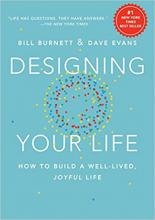
By: Bill Burnett and Dave Evans
Book description (via Amazon): Designers create worlds and solve problems using design thinking. And every design starts with a problem that a designer or team of designers seeks to solve. In this book, Bill Burnett and Dave Evans show us how design thinking can help us create a life that is both meaningful and fulfilling, regardless of who or where we are, what we do or have done for a living, or how young or old we are. The same design thinking responsible for amazing technology, products, and spaces can be used to design and build your career and your life, a life of fulfillment and joy, constantly creative and productive, one that always holds the possibility of surprise.
Why you should read it: “The book is based on a wildly popular course at Stanford to apply design thinking to life design,” says startup consultant Kate Yuan. “The questions the book strives to answer include, ‘How do I balance my career with my family?’ and, ‘How can I make a difference in the world?’ When I feel unproductive, stressful, or out of balance, the life hacks below from the book usually help me to get unstuck and gain clarity:
- Health/Work/Play/Love Dashboard. We want all these four areas of our life to be thriving. Write a few sentences about how it’s going in each of the areas. Mark where you are (0 to Full), and it will help you uncover what you need to prioritize more.
- Good Time Journal. Use a log to note down your daily activities and when you’re energized or not energized. Write down your reflections at the end of each week. After a few weeks, zoom in your activities and reflections, and see if there are any surprises. Try to orient your life towards what energizes you.
- Mind Mapping. To open up space for new solutions, you need to tap into your unconsciousness. Start by writing a problem/topic in the center of a large piece of paper. Then write down the first five to six words that come to mind. Repeat the process until you have at least three of four rings of word associations. The words from the outer layer will inspire previously unthought of solutions.”
Rework
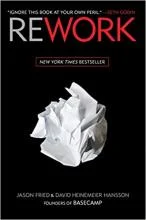
By: Jason Fried and David Heinemeier Hansson
Book description (via Amazon): The truth is, you need less than you think. You don’t need to be a workaholic. You don’t need to staff up. You don’t need to waste time on paperwork or meetings. You don’t even need an office. Those are all just excuses. What you really need to do is stop talking and start working. This book shows you the way. You’ll learn how to be more productive, how to get exposure without breaking the bank, and tons more counterintuitive ideas that will inspire and provoke you. With its straightforward language and easy-is-better approach, Rework is the perfect playbook for anyone who’s ever dreamed of doing it on their own.
Why you should read it: “The founders of Basecamp are known for their simple and no-nonsense approach to building businesses and creating value. This book has several great productivity lessons for both individuals and startups,” says Ganes Kesari, chief decision scientist at Gramener. “One learning that left a deep impact on me: interruption is the enemy of productivity. Turn off your notifications and batch-process your emails, messages, Whatsapp/social activities. This greatly minimizes the cost of context switching. This helped me get through the urgent stuff quicker and set aside more time for the important stuff that needed deeper thinking. The book has several productivity hacks for teams, meetings, and managing projects.”
[ Working on your soft skills? Read also: How to build soft skills: 10 must-read books. ]



